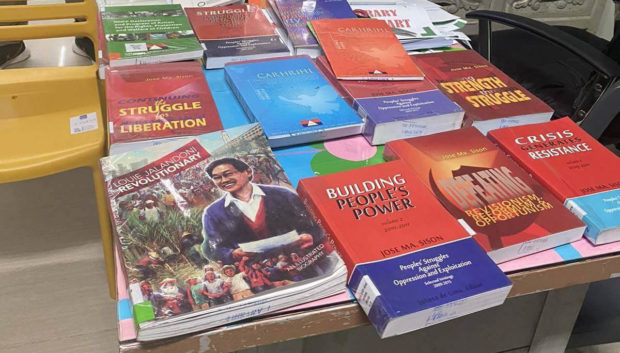
SUBVERSIVE TO READ These books and reference materials related to the communist insurgency were removed from the library of the main campus of the Isabela State University in Echague town. —FILE PHOTO
MANILA, Philippines — The biggest book industry alliance in the country has added its voice to the expressed outrage over the removal of “subversive” books and documents from university libraries, warning that the purge would “raise a future generation that is ignorant and subservient.”
According to the Book Development Association of the Philippines (BDAP), the removal of books with sensitive or challenging content is a violation of freedom in publishing and freedom of thought, and impedes critical thinking and empathy.
“When we ban certain books, we teach our young to retreat to silence when they need to speak. We push them to close their ears from fear when they need to listen, and we let them grow blind to what they should see,” it said in a recent statement.
The BDAP is composed of 92 members and organizations engaged in the book trade, including Adarna House, Anvil Publishing, National Bookstore, Ateneo de Manila University Press and the University of the Philippines (UP) Press.
It commended UP Visayas Chancellor Clement Camposano for refusing to follow the lead of Kalinga State University, Isabela State University, and Aklan State University in purging their libraries of books and documents deemed subversive.
“If we are afraid of books, then we have a problem,” he said.
On Oct. 21, the Cordillera regional office of the Commission on Higher Education (CHEd) issued a memorandum calling on state universities and colleges (SUCs) to remove “subversive” reading materials from their libraries and online platforms.
Failure to fulfill mandate
The purge of progressive reading materials including Marxist literature, documents on the peace negotiations between the government and the National Democratic Front, and books authored by Communist Party of the Philippines founding chair Jose Maria Sison has led to a heated exchange between UP Diliman officials and CHEd Chair Prospero de Vera III.
On Tuesday, UP Diliman’s University Council, the highest policymaking body on campus, issued a strongly worded statement calling out De Vera for “failing to fulfill” CHEd’s mandate to defend academic freedom.
The council said it was “appalled” that the call of UP Diliman officials “for solidarity for all higher education institutions to participate in the defense of academic freedom” was “used” by De Vera “to criticize UP and its leaders.”
“As such, he has failed to fulfill CHEd’s mandate as stated in Republic Act No. 7722, which is the defense of academic freedom,” it said.
UP Diliman’s University Council is composed of the chancellor (who serves as chair), professors, and associate and assistant professors.
Last week, De Vera defended the decision of the state universities in Kalinga, Isabela and Aklan to remove “subversive” reading materials from their libraries.
He urged UP Diliman officials to be “prudent” and “circumspect” in commenting on how other SUCs were governing themselves, especially in the exercise of academic freedom.
Before then, UP Diliman Chancellor Fidel Nemenzo and other university officials said the purge of progressive books and documents was an affront to academic freedom. They called on other SUCs to “protect our schools and ensure that these will remain sanctuaries of free thinking.”
Ideological criteria
The UP Diliman University Council stood by the UP officials’ recent statements, saying “the removal of books based on ideological criteria is anathema to academic freedom and undermines the role of academic institutions as repositories of thought.”
“This sets a dangerous precedent and a move toward the censorship of our universities,” it said.
The council is not the first to push back against De Vera’s warning to the country’s premier state university, which has long been seen as a bastion of free speech and activism.
Last weekend, UP Diliman’s Library Council also condemned the book purge in the state universities’ libraries, saying this was a practice “by dictatorships, not democracies.”
“Knowledge advances not by the exclusion of ideas, but by intellectual inquiry and scientific practice. Insurgencies are contained by addressing their root causes, not by banning books that explain how and why they happen,” the Library Council said.
It called on other librarians to protect libraries “from any form of censorship, and to resist any action that will compromise academic freedom.”
It added: “As gatekeepers of knowledge, we librarians and officials overseeing the UP System libraries are ethically bound to resist any form of political interference that would diminish the access of students and scholars to any materials they may need in pursuit of their studies.”